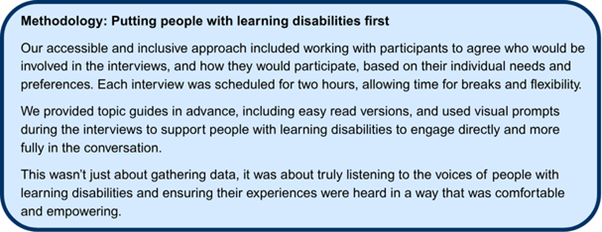
17 June 2025
Understanding the extra costs of living with a learning disability
Insights from our research for Learning Disability Week 2025
Cordis Bright is proud to have partnered with Mencap to explore the often invisible, yet deeply impactful, extra costs of living with a learning disability. Through interviews with 15 people with learning disabilities and their families, our study highlights the wide-ranging financial pressures they face, how they manage these costs, and the role Personal Independence Payment (PIP) plays in this. With the UK government considering significant reforms to disability-related benefits, our findings come at a pivotal moment.
The theme of this year’s Learning Disability Week is “Do You See Me?”. In line with this theme, our research explores the often-overlooked costs that people with a learning disability can face, ensuring their stories are part of the conversations about disability and welfare reform.

Exploring the full picture of additional costs
Our research revealed that the extra costs of living with a learning disability are not “nice-to-haves”, they are fundamental. Each person with a learning disability experiences unique challenges and therefore incurs unique costs; these underpin people’s health, dignity, and ability to participate in everyday life. The research revealed a wide range of essential expenses:

Participants spoke candidly about the difficult choices they must make when financial support falls short.
Personal Independence Payment: A lifeline that doesn't always stretch far enough
PIP was consistently described as essential for covering extra costs including mobility-related expenses, utilities, care contributions, and essential household items. Yet few felt it went far enough, especially considering the rising costs of living and inflation. This led to individuals and families subsidising shortfalls or limiting access to supports that improve quality of life. Some reported using food banks, others described skipping meals, and some spoke of long-term financial insecurity.
Listening to lived experience of accessing PIP
The PIP application and assessment process was frequently reported as complex and inaccessible, particularly for those without support or advocacy. Some people with mild learning disabilities described challenges articulating their needs, which may impact the accuracy of assessments and decisions.
A common theme was a lack of understanding from Department for Work and Pensions (DWP) staff, with several people telling us they felt “interrogated” or “misunderstood” when trying to explain their needs.
Looking ahead: Implications of reform
The proposed changes to PIP, including stricter eligibility criteria and more frequent reassessments for many, generated significant anxiety among participants, who worried about losing support that is integral to their quality of life and independence.
Key concerns include:
- Potential reductions in support for essential daily needs
- Increased pressure on unpaid carers
- Risk of isolation and deterioration in mental health
- Reduced opportunities to meaningfully engage in the community
Participants called for a person-centred approach to reform – that reflects the diverse and nuanced needs of people with learning disabilities.
What this means for policymakers
Our research suggests there is a clear need for welfare reform to be guided by the lived experiences of those it aims to support and rooted in evidence about the real barriers to employment and inclusion experienced by people with learning disabilities. In particular:

Closing thoughts
Our study begins to fill an evidence gap by highlighting the real and varied additional and unavoidable costs of living with a learning disability. It also reinforces the importance of listening to the voices of people with lived experience as the policy landscape evolves.
As we reflect during Learning Disability Week, we hope these findings will contribute to meaningful dialogue, and ultimately, real action, that supports dignity, fairness, and inclusion.
Read the full research report here.
Read Mencap’s policy paper that incorporates our findings here.
For more information about this research contact Beth Peach.
Join the conversation: #DoYouSeeMe #LDWeek #LearningDisability #DisabilityCosts
